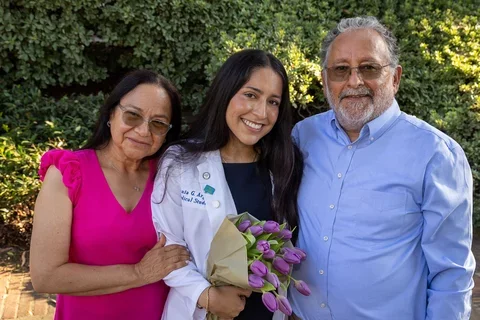Incoming UCLA medical students overcome obstacles on path to becoming doctors
3 tales of determination

Pictured: Urania Argueta celebrates the white coat ceremony with her parents, Rosa Raya and Juan Argueta. (Photo by Reed Hutchinson)
Nearly 200 incoming medical students attended the annual white coat ceremony, Sept. 8, at the David Geffen School of Medicine at UCLA.
Here are the stories of three of the new students who were celebrated in the traditional ceremony at Royce Hall: Urania Argueta, the daughter of migrant farmworkers; Zion Congrave-Wilson, a Black student who wants to expand diversity in the medical field; and Diana Jiménez-Briseño, a kidney transplant recipient.
Farmworkers’ daughter focused on culturally sensitive care
Urania Argueta was born in Salinas, to Rosa Raya and Juan Argueta, both migrant farmworkers from Guanajuato, Mexico, who spent long hours working in the fields of Monterey County.
While Argueta’s parents were working, her paternal grandmother took on the primary role of raising her. But as her grandmother’s health failed, Argueta became her caregiver, managed her medications, accompanied her to her doctor’s appointments, and translated her conversations. Through this experience, Argueta witnessed how poverty, discrimination and environmental racism led to poor care and outcomes for her grandmother
Argueta continued to see this theme while volunteering as a Health Advocate at Health Leads, as an undergraduate at UC Berkeley. There, Argueta witnessed patients’ concerns about lacking funds to afford food, rent, or childcare and she realized that whole-person care is essential to understanding and overcoming social barriers affecting the health of patients.
Now, she is committed to combating social injustices and health inequities by ensuring patient-centered and culturally sensitive care.
“As a Latina from a rural, low-income community, receiving my white coat in front of my friends and family felt like I was finally being welcomed into a world I never thought I would be a part of,” she said.
Student wants to be role model for underrepresented communities
Zion Congrave-Wilson grew up in Oakland, where his parents emphasized the importance of education and community service. These interests and a high school anatomy class propelled Congrave-Wilson to pursue medicine, but being a Black premedical student was often challenging, he said.
Zion Congrave-Wilson enjoys the medical school celebration with his stepmother, Michelle Borjal and father, James Wilson. (Photo by Reed Hutchinson)
Congrave-Wilson said his progress to becoming a doctor was stifled by the lack of people who looked like him among the undergrads and on the faculty. But his UC Davis community in undergrad and his research colleagues at UC San Francisco post-college helped build his confidence and reassured him about his ability to become a doctor.
As an incoming first-year medical student, Congrave-Wilson said he is looking forward to continuing his community service work and would like to be a role model and mentor, encouraging more underrepresented students to pursue medicine.
Kidney transplant recipient tackling health inequities
Diana Jiménez-Briseño is the proud daughter of Rigoberto and Alma Jiménez, both born and raised in Mascota, Jalisco. After emigrating to the U.S. in the ‘80s and ‘90s, respectively, they started a family in Ontario.
From a young age, Jiménez-Briseño and her sister, Bianca, took on the responsibilities of being first-generation daughters, including interpreting doctor’s appointments and navigating the health care system for their parents.
Diana Jiménez-Briseño spends time with her parents, Rigoberto and Alma Jiménez, who were both born and raised in Mascota, Jalisco. (Photo by Reed Hutchinson)
But at 14, Jiménez-Briseño was diagnosed with chronic kidney disease and needed to focus on her own health. Her struggles were complicated by language and cultural barriers, insurance issues, and a rapidly progressing disease that required a kidney transplant. Jiménez-Briseño said she is filled with the deepest gratitude and love for her donor, her sister.
Now, she feels privileged and honored to tackle health inequities in marginalized, under-resourced communities like her own.
“To be a first-generation Latina going into medicine is so powerful and to see the joy and pride of my family during the ceremony was so special to me,” she said. “Esto es para mi comunidad, desde Jalisco to the Inland Empire and now, L.A."
Original Article: "3 tales of determination: Incoming UCLA medical students overcome obstacles on path to becoming doctors"



